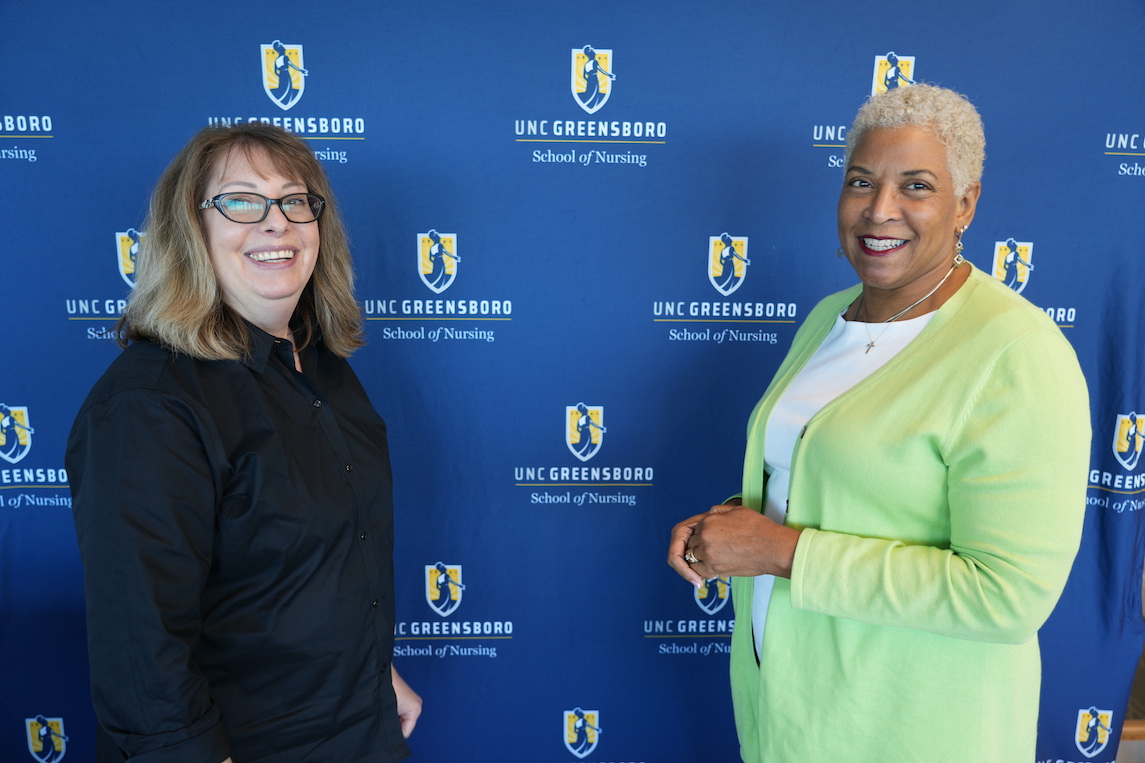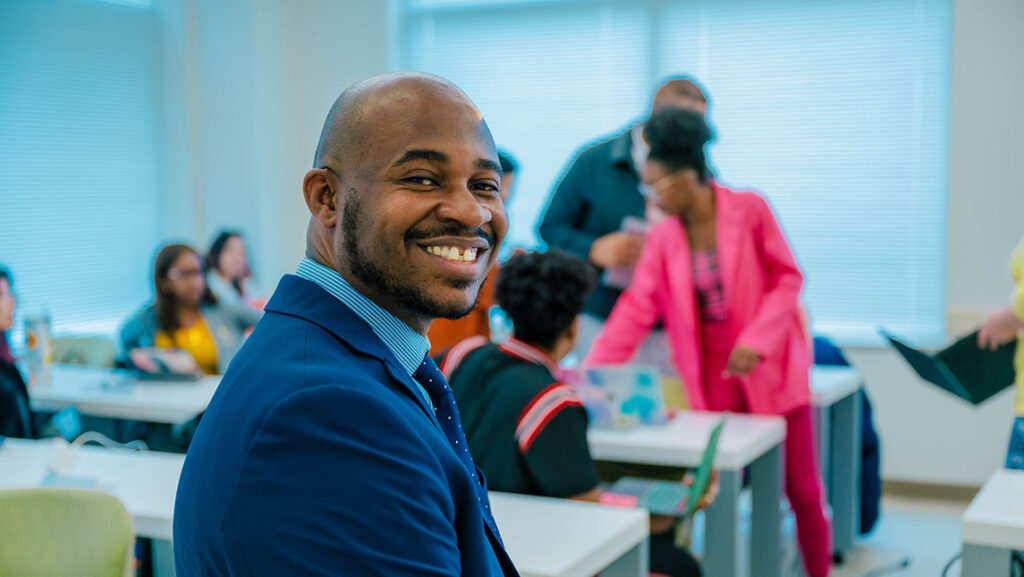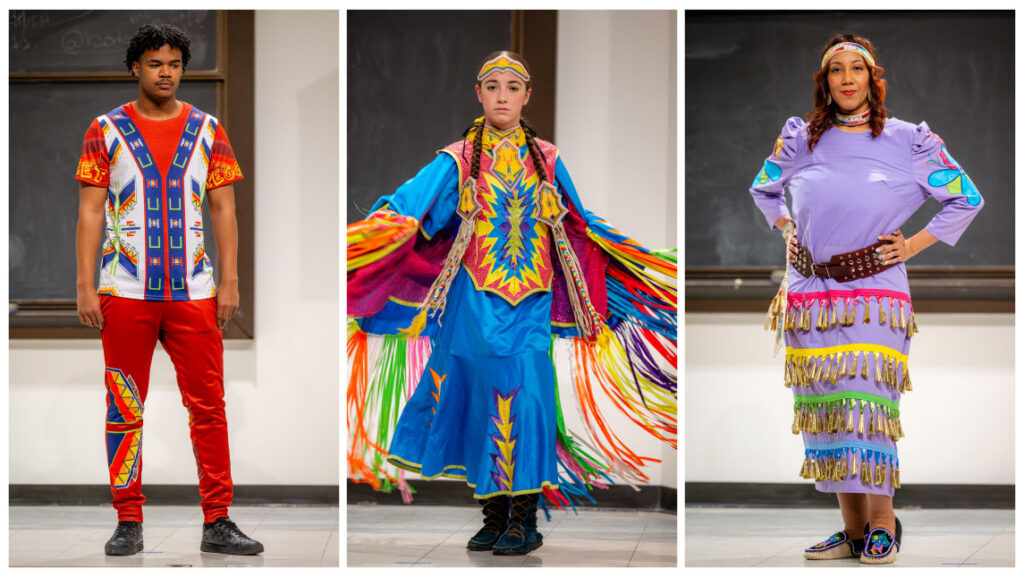Stacey Marye and Dr. Wanda Williams talking inside the Nursing and Instructional Building
The new full-time faculty members who joined the UNCG School of Nursing this fall are an eclectic group of nurse educators from across the globe. One worked in off-Broadway plays in New York, while another one was diagnosed with multiple sclerosis (MS) early on in her nursing career. All of them are impressive and bring their expertise and real-world experiences to their classrooms and clinical sites.
Learn more about the stories that helped shape each of the faculty members below.
Dr. Christine Kress
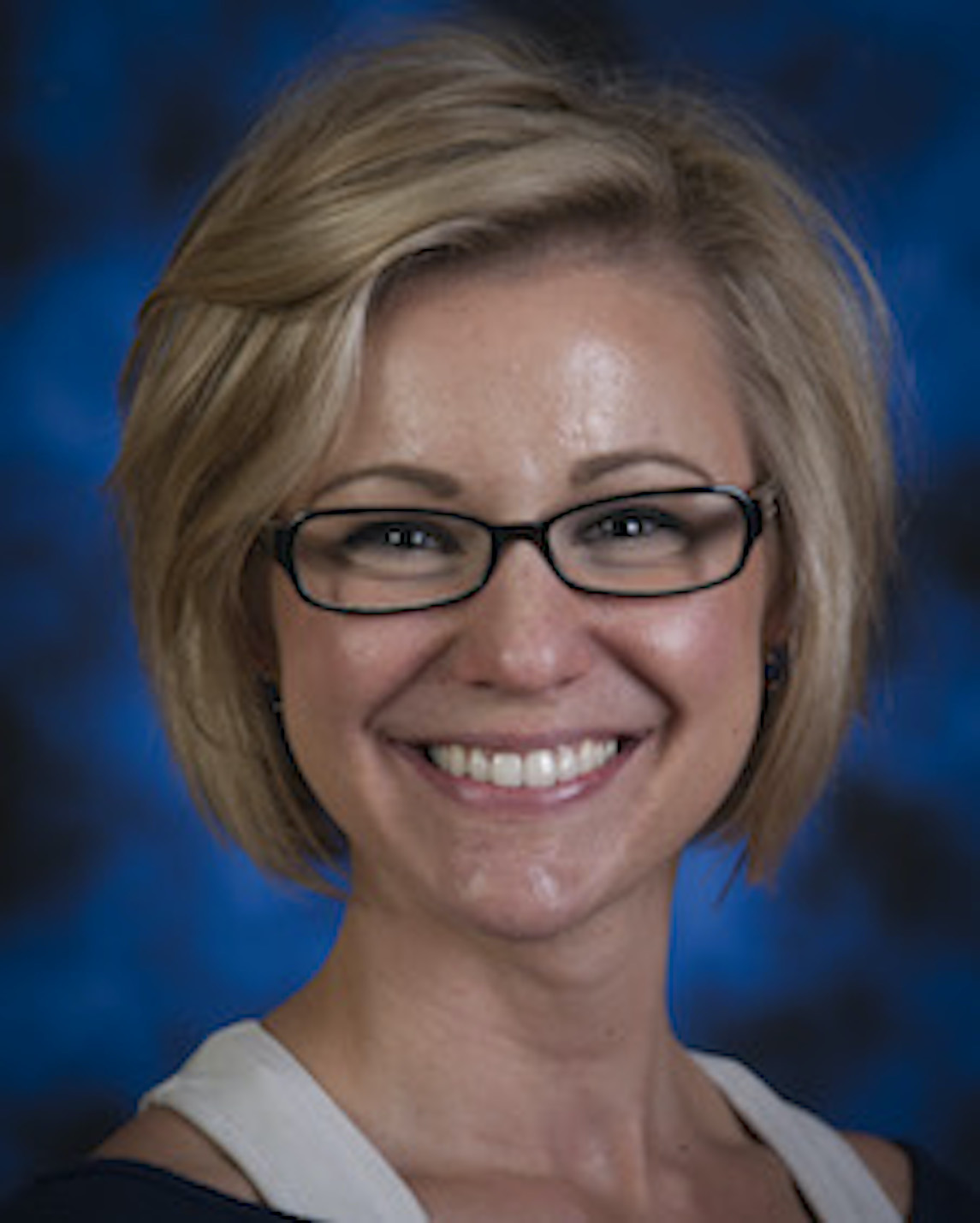
Dr. Christine Kress was working as a new nurse in the intensive care unit at Wayne UNC Health Care in Goldsboro when she discovered a patient had no pulse in one of her arms.
The patient needed surgery, and Kress immediately recognized the certified registered nurse anesthetist (CRNA) who came to pick up the patient for her procedure.
It was Kress’ father.
He worked as a CRNA at the same hospital where Kress had gotten her first nursing job. As it turned out, her mother also worked at the hospital as a pre-operative nurse.
“My dad walked in and was like ‘Who do I get a report from?’ And I was like ‘That would be me, Daddy,’” Kress says. “He was like ‘Wait. What?’”
Kress initially wanted to go to college and major in philosophy, but she took her father’s advice when he suggested she become a CRNA like him. Her decision paid off.
Kress graduated from UNCG’s nurse anesthesia concentration in 2010 and then served as a full-time faculty member in the School of Nursing from 2014-18. She has returned as a clinical assistant professor to teach the next generation of CRNAs.
“I always tell people anesthesia is like watching a duck swim. Above the water, it looks really easy. What you don’t realize is how hard the duck is kicking underwater,” says Kress, who earned her PhD from the School of Nursing in 2020.
“That’s exactly what anesthesia is like because until you do it you watch people do it, and you’re like ‘Dude, that looks easy. I want to do that.’ And then you do it, and you’re like ‘That was so not as easy as I thought it was going to be.’”
Kress got a glimpse into what it’s like to be a CRNA when she was around age 21 and close to graduating with her bachelor of science in nursing (BSN).
Her father was looking for someone to help him for three months after his anesthesia technician suffered a broken arm. Kress agreed to fill in as his anesthesia technician for the summer, and she followed him and other CRNAs around the hospital.
Kress says being a nurse anesthetist suits her high-energy personality. When she’s working, she’s paying such close attention to her patients she doesn’t have an opportunity to get bored.
She says teaching nurse anesthesia students is just as fun.
“It’s also humbling because you realize no matter how many years of experience you have that you still have things to learn, and I think that’s so important,” Kress says. “Because the moment that you feel like you know everything is the moment you hurt somebody.”
Stacey Marye
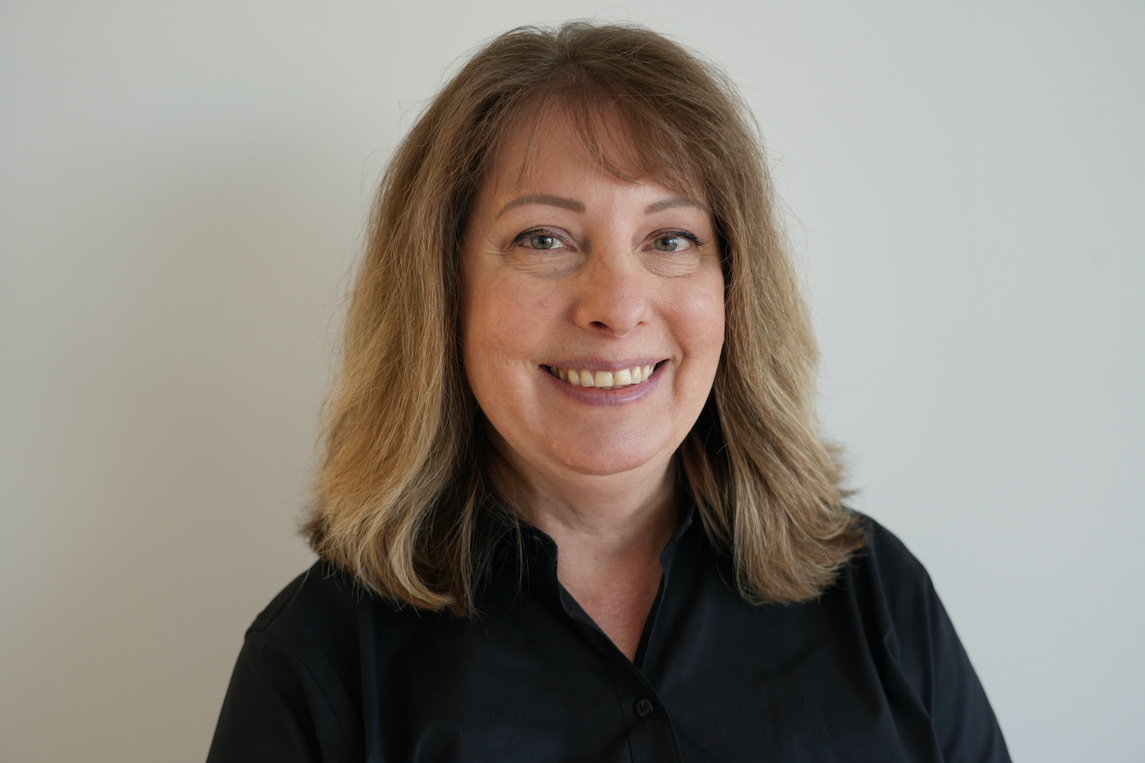
Before she became a school nurse, Stacey Marye worked on off-Broadway plays and in productions for colleges and community theaters around New York.
She did everything from building sets and sewing costumes to setting the mood for a scene by operating the stage lights.
Marye says she fell in love with the theater when, at age 14, a friend recruited her to press the buttons for the lights during a high school play. She was immediately hooked at how the different colored lights blended together to create “something absolutely magical.”
“I was kind of going on the assumption that I was going to eventually work my way to medical school, but I couldn’t let go of working in the theater because I loved it so much,” Marye says. “I had a ridiculous notion that I could do both professionally. Youthful optimism.”
Marye worked in theater production for 11 years before she started nursing school. She continued working backstage at shows during her school breaks.
Marye has since left the theater, and she joined the School of Nursing as an instructor this fall. As part of her position, she works two days a week in Reidsville as a school nurse at Moss Street Partnership School, which is operated by UNCG in partnership with Rockingham County Schools.
She treats Moss Street students and works with their parents and teachers to educate them on health issues that could affect children in and out of the classroom. She also provides School of Nursing students with clinical experiences at the school.
Marye’s research is related to treating children with asthma.
“I took my first school nurse job years ago simply because I had trouble finding good day care during the evening shift,” she says. “Immediately after starting it, the bell went off that ‘Oh my gosh, this is the community health nursing I was imaging when I started nursing school.”
Marye says being a school nurse is similar in ways to working in the theater. She’s part of a team made up of individuals with different skill sets, all coming together to impact someone’s life.
Marye still remembers the day when she decided it was time for her to leave the theater and devote herself to nursing.
“It was a very sudden moment. I was 30. I was quite pregnant and climbing a high ladder to get to a lighting unit to change the color,” Marye says, laughing. “About three-quarters of the way up the ladder, I looked down and said, ‘I don’t think I’m going to do this anymore.’”
Dr. Stacey Schlesinger
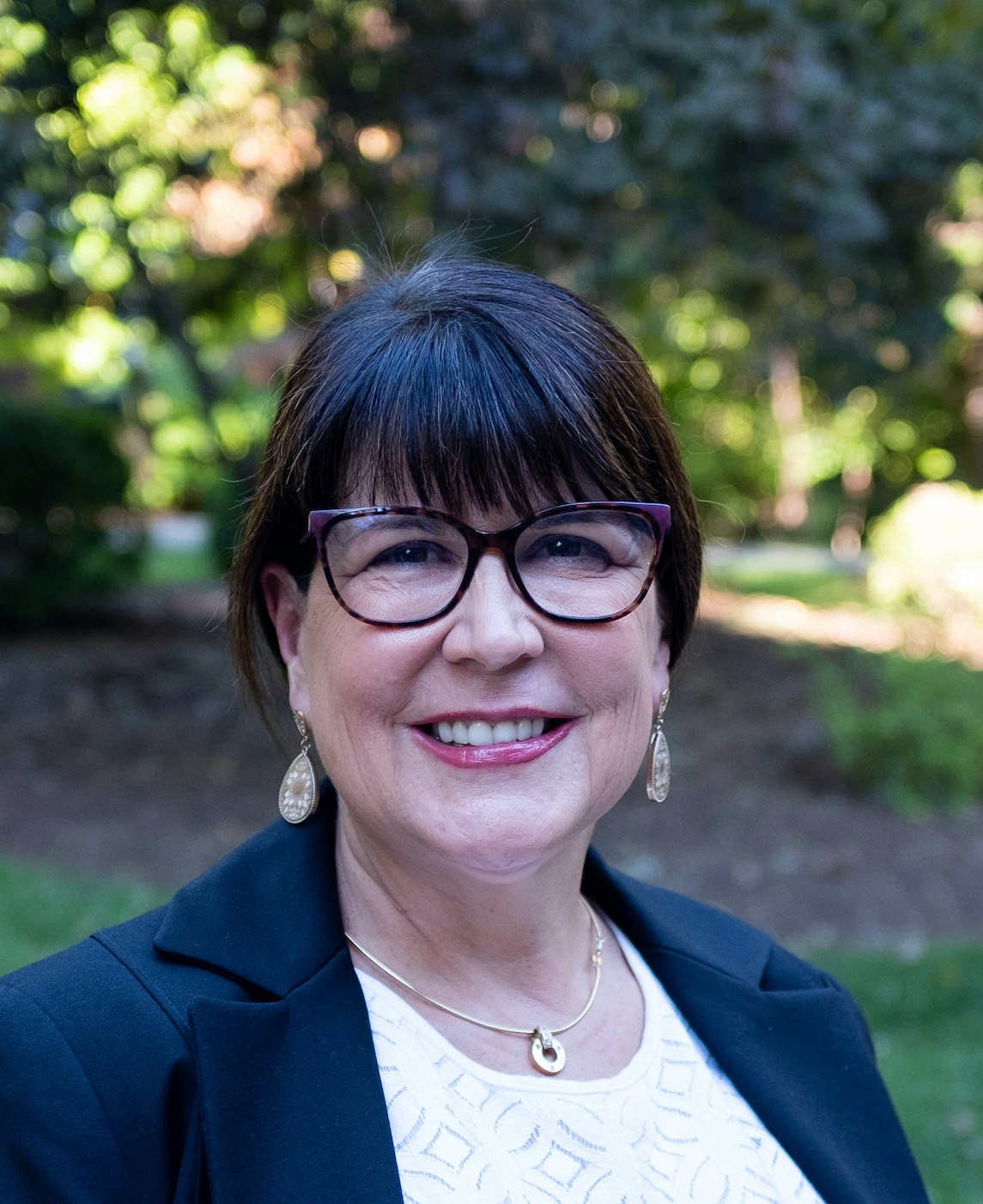
Dr. Stacey Schlesinger joked that growing up her only career option was to become a nurse.
She comes from a family of nurses, so the expectation was that she’d follow her mother and her two aunts into the profession.
As a kid, Schlesinger spent time at the New York hospital where her mother worked in the neonatal intensive care unit. She also celebrated holidays at the hospital.
“My parents said, ‘You can go to a two-year nursing school, get an associate’s degree, and then you can do whatever you want,’” Schlesinger says, laughing.
Schlesinger says her dream was actually to become a teacher. As a clinical assistant professor, she’s now getting the opportunity to teach in the School of Nursing’s doctor of nursing practice (DNP) nurse anesthesia concentration.
Schlesinger has worked as a CRNA since 2000. At age 52, she decided to go back to school and earn her DNP from UNCG.
She graduated in May, and she was excited to return to the School of Nursing and again be in a classroom setting – this time as a faculty member.
“My experience as a student in the nursing program at UNCG was top-notch,” Schlesinger says. “The same things that attracted me as a student to go there for my DNP are the same things that have attracted me to want to work there.”
As her nursing career progressed, Schlesinger says she thought she’d eventually become a hospital administrator. With that goal in mind, she earned her master of science in nursing (MSN) and a master of business administration (MBA) in 1994.
However, Schlesinger couldn’t find a job as a hospital administrator after moving with her family from New York to North Carolina. She also wanted to continue providing hands-on care to patients.
One of Schlesinger’s friends was in nurse anesthesia school at the time. Schlesinger learned more about what CRNAs do while shadowing several of them as they worked, and she fell in love with the fast-paced, independent nature of the job.
Schlesinger calls herself a “lifelong student.” She’s now teaching nurse anesthesia students while continuing to practice as a CRNA.
“Nurse anesthesia students are different in that they’re all experienced nurses coming in, and they have diverse backgrounds,” Schlesinger says. “Although they’ve all been required to work in critical care, that runs the gamut from babies to adults in different kinds of settings.”
Kimberly Siegrist
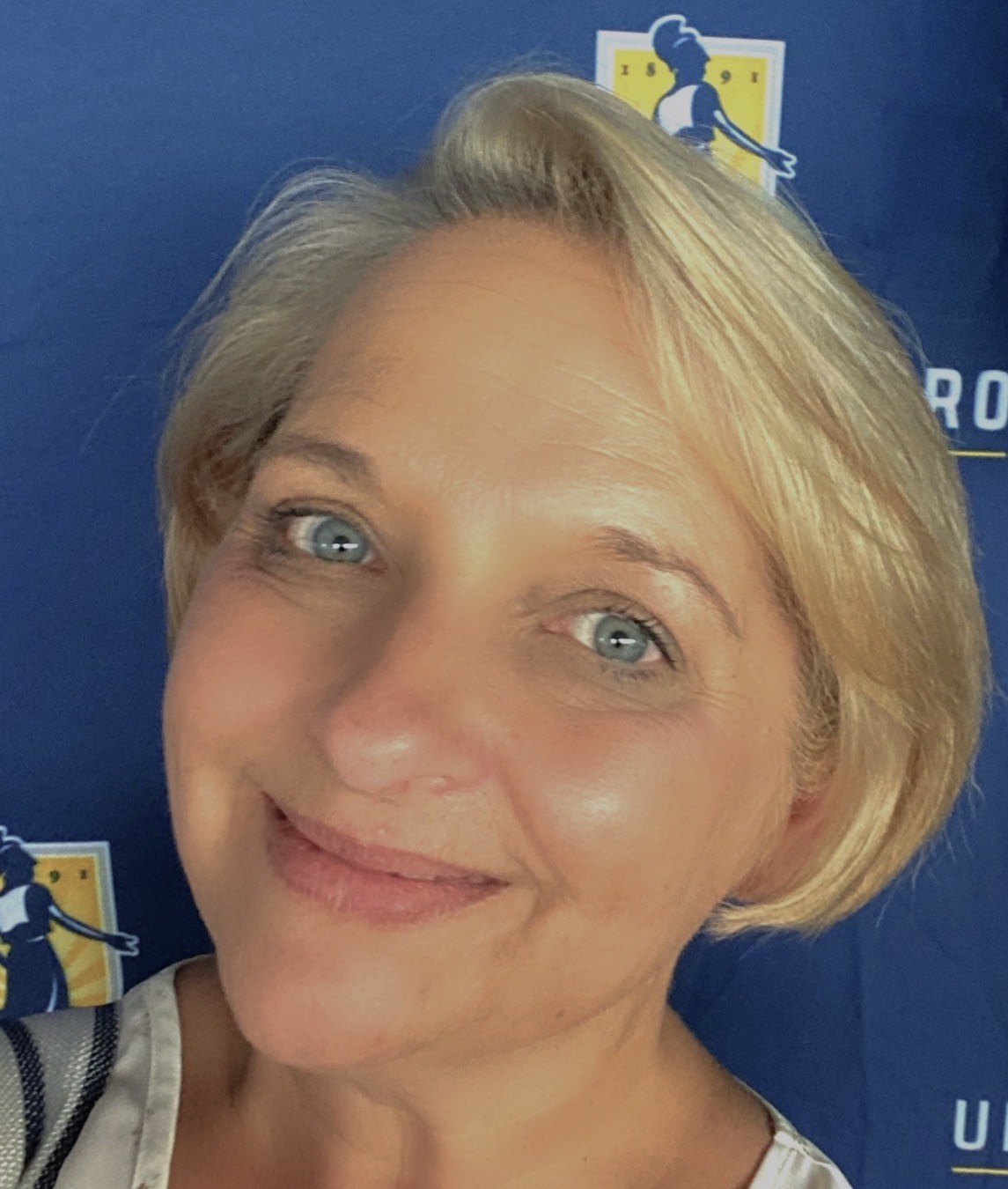
Kimberly Siegrist was age 23 and working as a registered nurse in a hospital’s emergency department when she was diagnosed with MS.
The diagnosis convinced Siegrist to leave her job at the hospital for a less stressful one in managed care. Over the years, she has “dabbled” in a wide variety of nursing roles.
“My MS providers were all very clear to me that high-adrenaline environments are probably not really great with treating my MS,” she says.
Siegrist understands what it’s like to be a patient sitting on the opposite side of health care. In 2015, she left her nurse practitioner practice after a tumor was discovered in her brain.
Siegrist is now using her experiences and her high-energy personality to teach students as a new clinical instructor in the School of Nursing. She has expertise in pediatrics and mental health, both of which she has seen up close as a nurse and the mother of three.
Growing up in southern Ohio, Siegrist said her parents encouraged her to become a nurse. She knew, however, that they couldn’t afford to pay for her to be the first of her siblings to go to college.
As a result, Siegrist enrolled in the Christ Hospital School of Nursing in Cincinnati, Ohio, where she earned a nursing diploma while working full-time at the hospital and living in a dorm right behind it.
One day, as she was doing a clinical rotation at the Cincinnati Children’s Hospital Medical Center, Siegrist saw a child playing in a playroom. The child had undergone open-heart surgery the previous day, and there was a large scar running down his chest.
What Siegrist saw inspired her to get interested in pediatric nursing.
“To me, the resilience that that demonstrated, how kids don’t know they’re supposed to hurt so bad that they don’t want to get out of bed,” Siegrist says. “They could be distracted with play, and they get up and they honestly recover so much faster.
“I was just intrigued by the fact that kids are just so resilient.”
Later, as a nurse practitioner, Siegrist expanded her focus to include mental health after seeing how it affected her oldest daughter. She wanted to educate others on mental health issues.
“By the time my daughter got her diagnosis, it became very evident how terrible our system is, first with identifying and treating mental health issues, especially in children,” Siegrist says. “The mantra is ‘Don’t label the child.’ The problem with ‘Don’t label the child’ is you’re also not treating the child because if you can’t name it, you can’t tame it.”
Dr. Wanda Williams
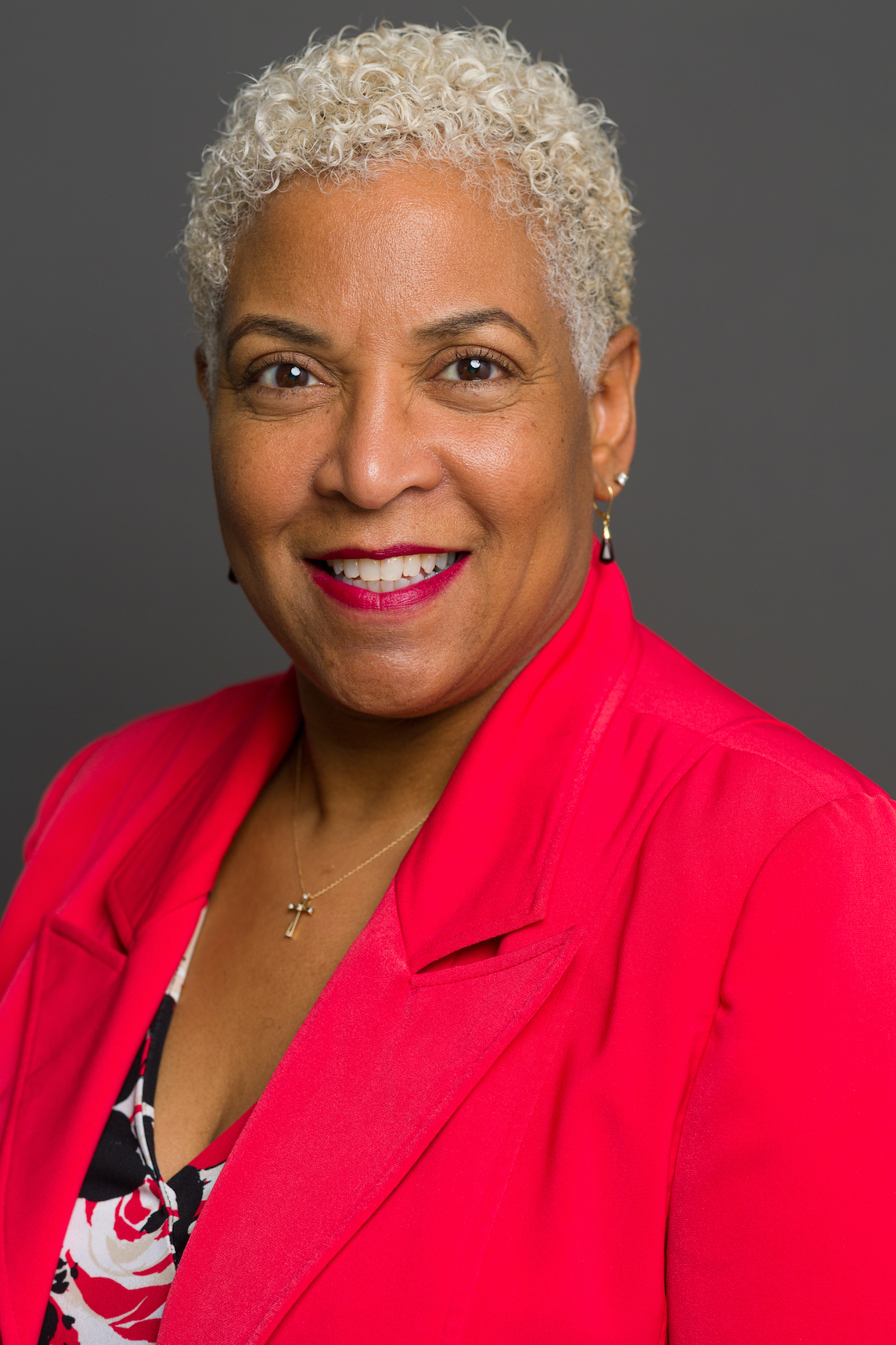
As a teenager, Dr. Wanda Williams knew the career choices for women were limited, even more so for her since she didn’t want to become a teacher.
Williams decided to take part in a vocational program that her high school in Rockingham County offered. A registered nurse taught the program, which introduced students to such health occupations as nursing, physical therapy, and occupational therapy.
Williams says she was intrigued by how much variety there was in nursing.
“Even though I’m faculty now, I couldn’t see myself teaching and doing the same curriculum year after year,” Williams says.
Born and raised in Reidsville, Williams has returned home to join the School of Nursing faculty as an associate professor who specializes in women’s health. She’s also the director of the DNP program.
Williams graduated from UNCG with her MSN in 1989 and her PhD in 2010. Her experiences as a working nurse in graduate school influenced her decision to come back to the School of Nursing more than a decade later.
After working in a hospital’s geriatric and maternity units, Williams says she decided to earn her MSN and become a nurse practitioner. She wanted to advocate for women’s health, particularly Black women who often don’t receive proper care.
“When I met with the faculty at that time at UNC Greensboro, I felt they were more accepting of the fact that I was a nurse who was working. They were more willing to work with your schedule,” Williams says. “They accepted that I was an adult learner. I had other responsibilities, and their schedule was more conducive to someone who was working.”
Still, Williams didn’t envision herself someday teaching.
As a nurse practitioner, she was concerned that many of her patients were under age 30, already overweight, and had high blood pressure and prediabetic signs. She wanted to develop programs to address the issues she was seeing on a daily basis.
Someone told Williams that she’d have to start these programs herself if she wanted to get them done. As a result, she decided to return to UNCG to earn a PhD.
“So my interest was to get my PhD to be able to apply for funding and then to implement programs that would improve outcomes of Black women,” Williams says. “But with scholarship comes teaching. Although I never saw myself as a teacher, I have enjoyed my role in academia to guide the next generation of nurses and to serve as a mentor and role model for future nurses.
“I also found that it is important for minority students to see someone that looks like them also teaching.”
Dr. Vicky Yeh
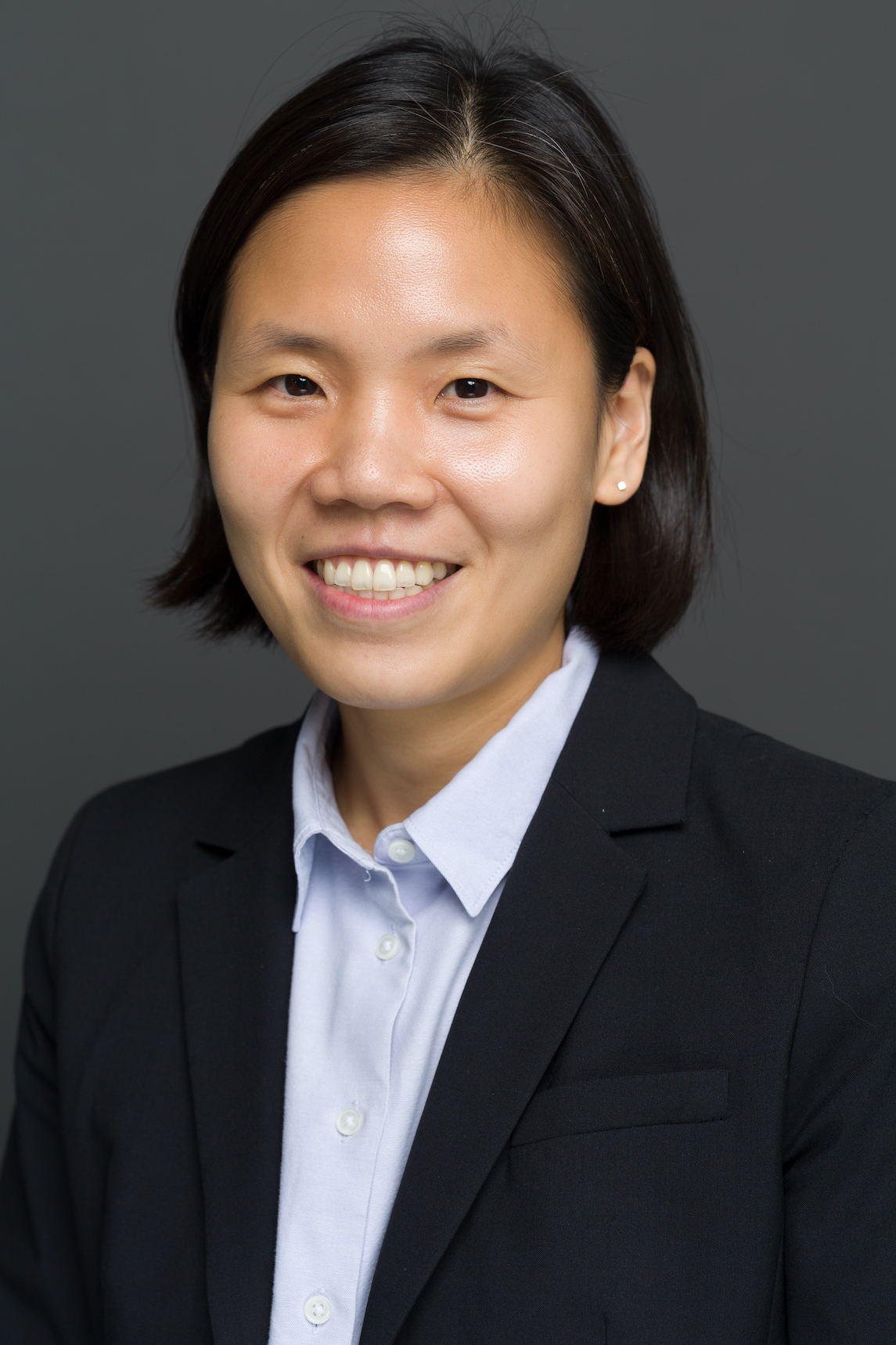
Dr. Vicky Yeh admits she dreaded having to take part in simulations as a nursing student.
She didn’t enjoy being the center of attention as her professors and classmates watched her interact with manikins and actors pretending to be patients. She didn’t feel she learned much from being forced to participate in simulations under stress.
“I did not like simulations when I was a student. It was too stressful,” Yeh says. “In grad school, I had in mind to do a research project proving that simulation does not work for every student. But suggested by my mentor, I decided to take a class where I had to be in simulation every week.
“It was that experience that helped me realize that it does help when carefully designed and implemented, even for students who don’t like simulation. Because it is not just about the comfort of the students, it is about the patients.”
Once not a fan of simulations, Yeh now helps design them for the School of Nursing.
In her new role as a clinical assistant professor, she puts students through simulations to get them more comfortable and confident with treating patients during their clinical rotations and eventually as nurses.
Yeh says she wants to help students get over any fears they might have of becoming a nurse, which is something she dealt with early in her career.
Growing up in Taiwan, Yeh frequently visited her father as he did administrative work for a hospital. Her mother also used to be a labor and delivery nurse. It felt normal for Yeh to hang out at the hospital as a kid.
Yeh says she had the option after finishing middle school to attend either a traditional high school or enter a five-year junior nursing college and earn an associate degree in nursing before age 20.
“One of my friends was thinking about going into nursing, so I went in because I knew a person going into it,” Yeh says. “So my interest in nursing happened much later than my decision.”
After earning her associate’s degree in 2006, Yeh moved to the U.S. to pursue a BSN. However, she was overcome with fear as her graduation approached and she started applying to nursing jobs.
“I was thinking about critical care when I was about to graduate, but then I had that fear that I don’t think I’m good enough to go to the clinical work just yet,” Yeh says. “So I applied to grad school at the same time.”
Yeh became interested in nursing education and utilizing simulation as a BSN-to-PhD student. She changed her focus from community health and began seeing simulations, when coupled with deliberate practice, as a powerful tool to help students learn.
“I started to think about, ‘Oh, how we could better help students transition from school to practice because that’s a problem that I had?’” Yeh says. “I was afraid of going into nursing, so I kind of wanted to work on how we can better prepare students to overcome that obstacle and become the independent clinicians they are so capable of becoming.”
Story by Alex Abrams, School of Nursing
Photography provided by the School of Nursing
UNCG School of Nursing
To learn more about the UNCG School of Nursing and its faculty, visit the website:
